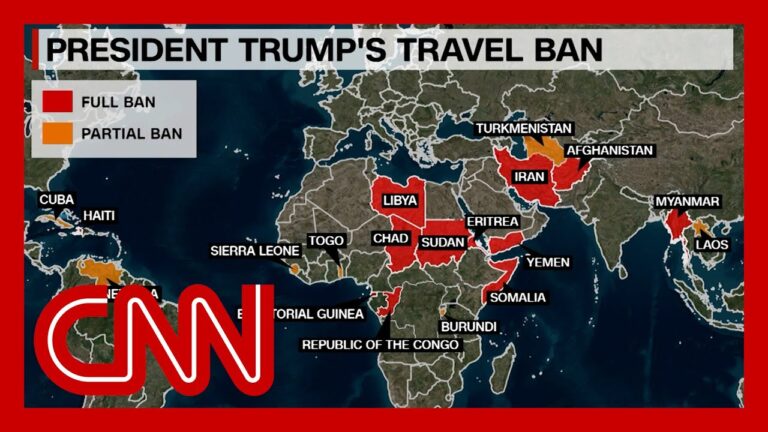Video at the bottom!
This morning, President Trump’s new travel ban is officially in effect, restricting entry to citizens from 12 countries, primarily in Africa and the Middle East, while imposing new limitations on travelers from seven additional nations. CNN’s Kevin Liptak reports that the White House believes this could impact tens of thousands of foreign nationals, pointing to inadequate screening and vetting processes in these countries as justification for the ban. The State Department clarifies that the restrictions apply only to individuals outside the U.S. without a visa as of today, with certain exceptions for dual nationals, diplomats, athletes participating in major events, and select individuals facing persecution.
The ban, framed as a necessary measure to prevent terrorism, has faced scrutiny, especially as tensions surrounding the administration’s immigration enforcement escalate. Comparisons were drawn to previous extreme actions from Trump’s first term, indicating that the administration has adjusted its approach to bolster legal defenses against challenges that might arise in court.
Shawn Vandiver, president of Afghan Evac, highlighted the complexities surrounding the Special Immigrant Visa (SIV) program, designed to assist Afghans who aided the U.S. military. Despite exemptions for these individuals, he raised concerns about the dismantling of crucial support systems necessary for their relocation. With many still needing to come to the U.S., the absence of strong infrastructure under the current executive order complicates the situation for Afghan allies, some of whom face immediate dangers and repercussions from the Taliban.
The ongoing crisis reportedly includes 250,000 Afghans awaiting relocation, along with thousands of family members of active duty service members who remain at risk. Vandiver underlined that the American public largely supports the resettlement of these wartime allies, despite the administration’s current stance.
Concerns about the Taliban’s capacity to issue passports and vet individuals created further discord, emphasizing the urgency and danger faced by those left behind. While the framework of the new travel ban may be more organized than previous attempts, experts argue that its rationale, particularly regarding visa overstays, presents potential avenues for legal opposition.
As the implementation unfolds, the uncertainty around the status of both current immigrants and those waiting for reunification continues to pose challenges, particularly for those navigating the complex U.S. immigration system. Vandiver advises those affected to connect with immigration attorneys to ensure their cases are properly managed during this tumultuous time.


